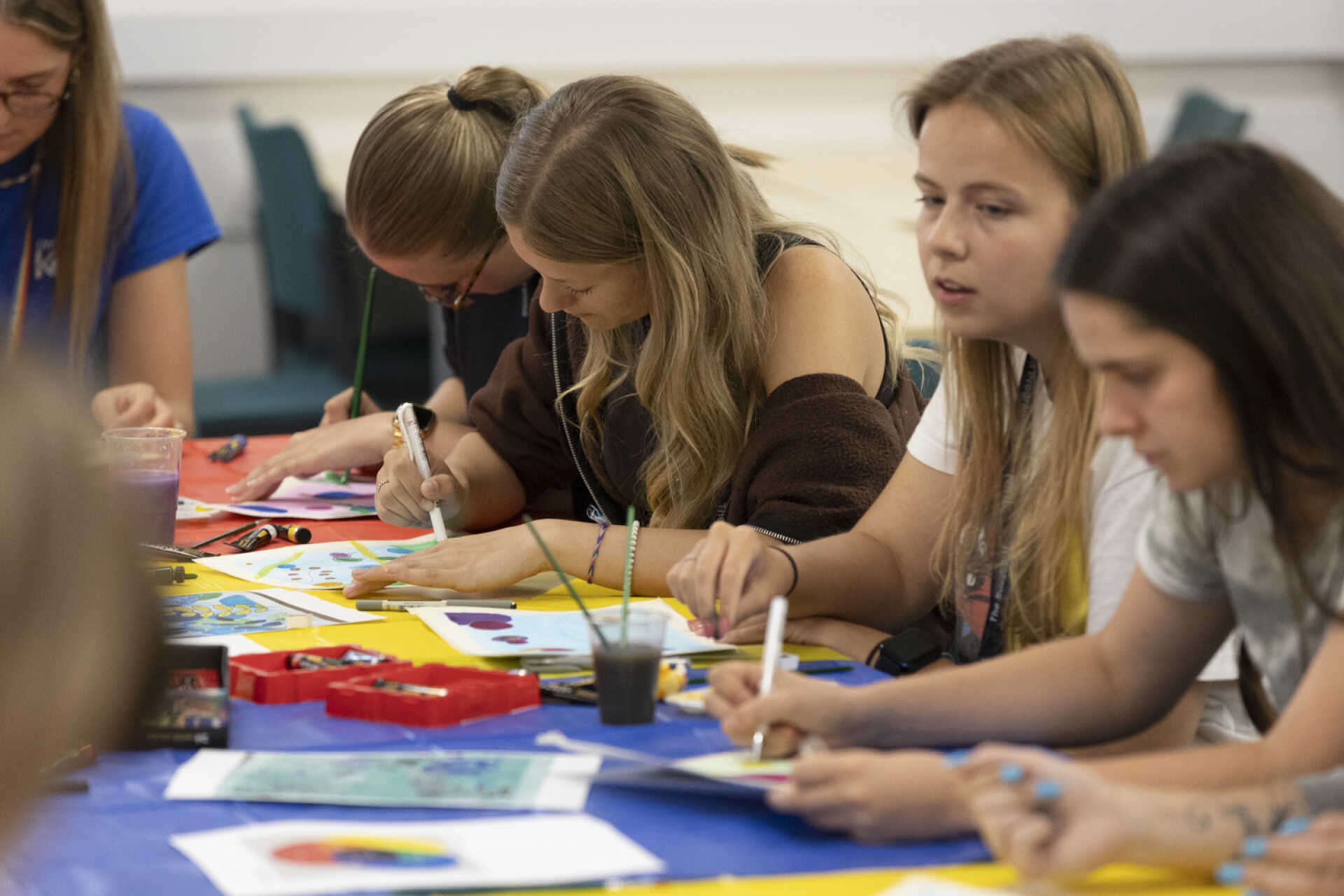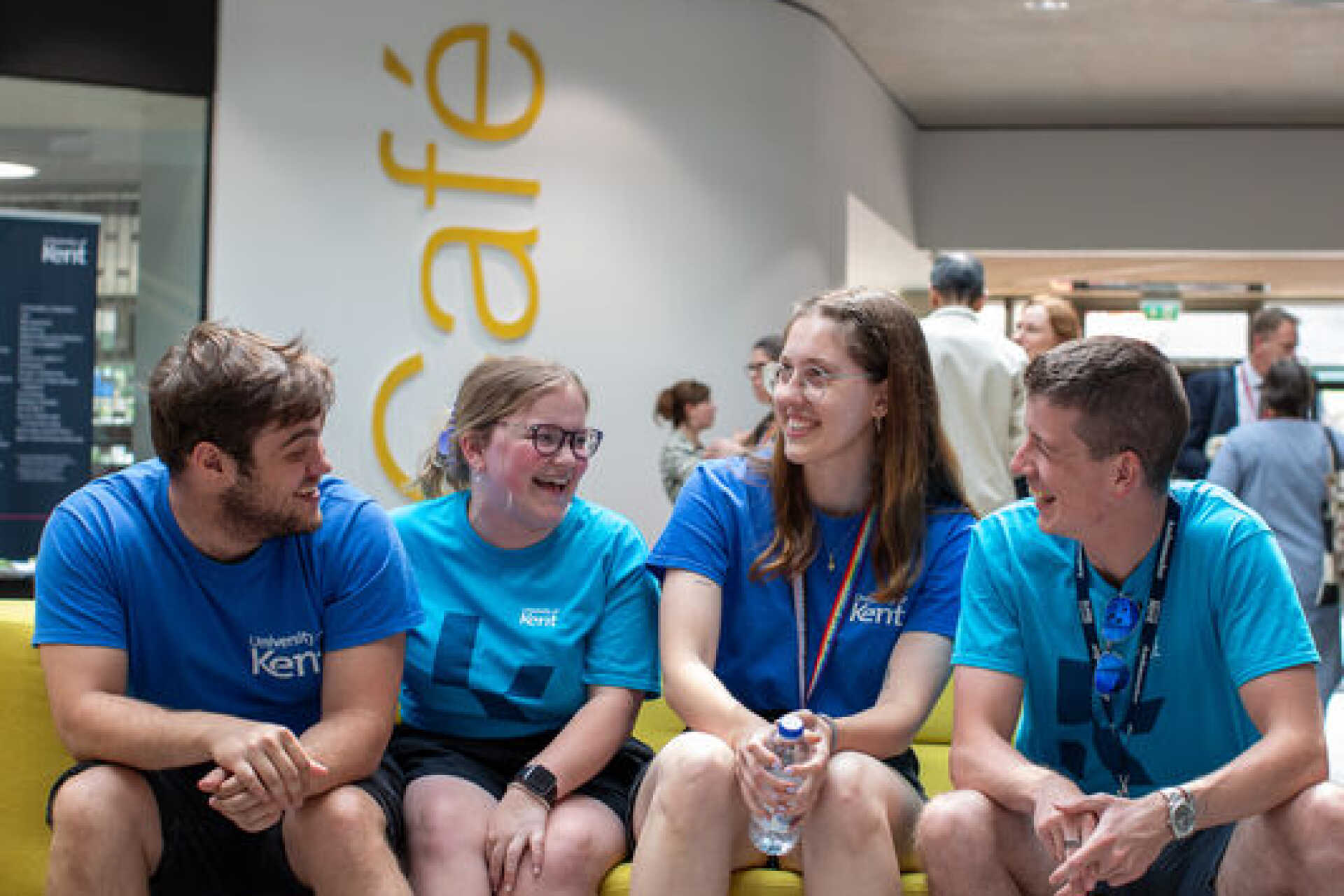At the University of Kent, we stand for ambition. We are committed to supporting students to access, succeed in, and progress from, university, regardless of their background. For young people with a background in care, or those who have experienced estrangement, there are many practical elements to consider. In line with the commitments of our Access and Participation Plan, we have designed a programme of outreach activity and support services specifically to address the needs of care-experienced and estranged students.
Who are care-experienced and estranged students?
Being care-experienced means you will have spent time: living with foster carers under local authority care; in residential care (e.g. a children’s home); being looked after at home under a supervision order; or in kinship care with relatives or friends - either officially (e.g. a special guardianship order), or informally without local authority support.
A care leaver is someone who is, or has been, in the care of the Local Authority for a period of 13 weeks or more, spanning their 16th birthday.
An estranged student is someone who is studying without the support or approval of their parents due to a breakdown in relationship.


All of the work we do for care-experienced young people is in collaboration with the Targeted Outreach Ambassadors, a team of current University of Kent students who all have a background in care.
Find out more about who they are and their experiences here:
Hiya, my name is Mercy and I’m a student studying Spatial and Interior Design at Kent. I have just currently finished my first year and am looking forward to starting my second. I am also a care-experienced student, meaning I was in foster care for 9+ years in which I lived with other people rather than my biological family. Even though this occurred, with the help of my social workers/ personal advisor and family, I succeeded in making it to university where I will continue to learn, study, and have fun until I graduate whilst also sharing my experiences with everyone! This way you all can make decisions you’re proud of and can feel less stressed about the transition into higher education.
Hi, I’m Leah. Having grown up in the care system, moving between different foster homes and living with my biological family, I experienced a lot of instability and uncertainty about the future. However, these challenges made me more resilient and driven to pursue a university education. My experiences motivated me to set goals for myself and take the next steps towards a better future. University provided stability for the first time in my life, as I knew where I was and that I wasn't going to be moving. I received invaluable support from various services and people who offered financial assistance and guidance, helping me stay focused and determined. The University of Kent has provided a space to support my aspirations, form new relationships, and envision a fulfilling future. I am grateful for the stability and opportunities I have now, and I am committed to making the most of them.
My name is Kylie and I’m a Masters student at Kent studying English and American literature. I had always wanted to go to university, but I became estranged from my family at a young age and became homeless as a teenager. I didn’t know at that time that there were supports for young people to be able to enter into Higher Education. I came to Kent as an undergraduate in my 30’s and it’s changed my life in a massive way! I now feel happy, settled and in control of my life. I’ve loved being able to use my experiences to help others whilst working as a student ambassador. I hope to continue my studies and work within outreach in the future.
My name is Michael, and I have just graduated from my degree in Law and now undertaking my master’s in social work with a scholarship from Frontline. My journey to university was not easy, as like many other care-experienced people. I did not believe in myself and undermined myself hugely when I was applying to law schools, I picked ones that I really did not like as I did not think I would ever be able to get into the ones I loved. However, on results day, I was so surprised by my results that I declined both my firm and insurance and went through clearing to get into Kent. My journey to where I am today, and how I got my scholarship with learning to believe in myself and feel empowered by my journey.
Would you like to share a bit about your experience as a Targeted Outreach Ambassador?
Kylie: Being a Targeted Outreach Ambassador is one of my favourite things about studying at Kent. I’ve been a student ambassador since I started my degree and more recently joined the targeted outreach team. It’s an amazing job to have. It’s fully flexible around my studies and I feel like I’m a part of a project that is really making a difference. I feel I’m able to use my background for something that is able to really help others. Navigating the transition to university can be scary, so being able to connect with others who may understand your journey a bit better than most takes some of the fear away. I feel really proud to be a Targeted Outreach Ambassador and I feel fully supported by the team in everything we do.
Leah: Being a Targeted Outreach Ambassador is empowering, as it allows me to grow personally and change the lives of young people and how they look at Higher Education. I have been able to share my care experience and turn it into a strength by helping young care-experienced people overcome stereotypes and look towards a better future for themselves. It feels amazing to work with young people and make them feel understood and accepted as we understand their experiences. From my lived experiences, I understand the importance of working with young people and the people that support them to foster better conversations about the young person and the future they can envision for themselves. The role has allowed me to make meaningful change for care-experienced students who otherwise would not consider going to university or are told by supporters that it is an unrealistic idea. Not only are we informing them about university but also holding sessions to understand their inner selves and empower them to see that they are more than the experiences they have been through and in fact they can do amazing things.
Mercy: As a Targeted Outreach Ambassador, I have been able to find a community within the university dedicated to helping and better understanding care-experienced students. Through this, I have met so many different young people and learnt their stories of being a foster child. This information made me feel very empathetic to their situation, completely knowing what it’s like. I’ve also made quite a few new friends with those I work with in the team who I’m able to share my experiences with and learn their own in an environment which isn’t filled with pity but acknowledgement. Being a Targeted Outreach Ambassador has also helped with my own identity in understanding I’m not the only one from a background like this and that there are many students just like me wanting to go further with education but don’t have the resources to do so yet. So being a part of this and teaching students how they can go to university is really uplifting.
Michael: Having this role has been amazing. It has helped me with understanding my own story and using it to empower other care-experienced people but also professionals. I feel annoyed by the system, and this role has allowed me to use that annoyance to create change and empower the professionals to help care-experienced people with our journey to university!

Here at the University of Kent, we have an amazing team of Targeted Outreach Ambassadors. They are all care-experienced students, supporting other care-experienced people and their advisors. We asked them about university life and their work as Ambassadors. Here is what they had to say!
Mercy: Apply early on and ensure you have all your documents from your social worker stating that you're a care leaver. This is super important as it helps to provide evidence of your situation for them to award you the correct maintenance loan. It also helps to understand how much money you’ll be working with in your budget.
Michael: Budget, budget, budget! Learning what money you have coming in and going out of your accounts each month will help you massively with planning what you can do! Money can come from so many places, charities, university or your local authority.
Kylie: Search for additional support! There are lots of scholarships and bursaries available through sites like The Scholarship Hub. Scholarships and bursaries don’t need to be repaid so there are pots of free money that often go unclaimed and some of them are care leaver/estranged student-specific. You have nothing to lose by sending in your application.
Leah: Have a thorough look at accommodation options, including virtual tours and prices. See what you feel comfortable with and what fits within your budget, so you can be sure of where you’ll be staying and avoid any surprises. We also offer summer accommodation, so if you need to stay on campus, this option is available for you!
Kylie: If you’re considering staying off campus, I highly recommend searching for private rentals through housing associations. Many associations offer market-rent homes alongside social housing. These properties are often cheaper than private rental homes. They can be difficult to find so I recommend starting your search early via many housing associations' websites.
Michael: We are so used to moving around or staying with new people. However, change can be something quite intimidating or even triggering. Make sure that you reach out to your support network and check in with them.
Mercy: Contact Student Support and Wellbeing before starting university, so they’re able to designate you an advisor who will be able to support you from when you start, until you graduate. I recommend sharing your social worker or PA’s contact details with the wellbeing team so they can speak on your behalf when needed and prompt for extra support if needed.
Leah: Sometimes you won’t find everything online, so it’s better to ask someone! The staff are happy to help, and we have a dedicated team for care-experienced student enquiries. There is also monetary support, like the Care Leaver Bursary.
Michael: You do not need to tell them everything! I was very reluctant to reach out for support as I thought I had to tell them all about my past, but there is no need to.
Kylie: I recommend ticking the UCAS box that allows the university to see that you are a care-experienced student. The university will be able to reach out and offer the best support for your personal circumstances.
Mercy: Getting ready for university can be stressful. However, if you organise yourself with dates and times, it will make it much easier for you to track and break down what you need to get done in the summer.
Michael: Reach out to your local authority and see if there is any support that they can offer you with buying resources for university, such as a laptop or kitchen utensils.
Look at the course that you are doing on forums and see if there is anything that current students say to do before doing it, maybe it is to read a really important book before the degree, or even to watch a certain documentary. Getting a head start is always helpful!
Leah: Start packing for university and buying essential items; try not to take too much with you. Remember to have any important documents ready for your admission. It’s a good idea to make a checklist so you can track what you have packed and what’s left to get.
Leah: Everyone is nervous when they first join University! Don't worry! Go out there and make friends. Prioritize your health by taking breaks from work to avoid burnout, allowing yourself to rest, and making plans with friends to have something to look forward to at the end of the week.
Mercy: Spend days/ weekends, if possible, in the area you’ll be moving to. This way, you’re able to establish what’s there and get used to the environment you’ll be living in for the next 3+ years. Another tip would be to research if some of your favourite hobbies or clubs are available at your new university or in the local area. This can ease some of your anxiety as you’ll be able to continue doing things you enjoy.
Michael: Leaving a place where you are settled and moving to a new place might be challenging. Never feel that you are alone. You are at university, you made it, now it is time to enjoy it! Embed yourself in the university life, find societies, friends, and new hobbies.
Leah: Make sure to showcase your motivation, passion, skills and experiences in your personal statement so you stand out to the admissions team as to why you would be a good student for the course. Be honest and authentic in your writing, showing what sets you apart and why you would be a perfect fit for the University!
Michael: Never underestimate yourself! If you think you can do the degree and get into the university, apply for it! Believe in yourself, and never undersell yourself!
This is your life for the next 3 years that you are applying to. Make sure you pick a degree that you love, not one that others are telling you to apply to. You are no different to anyone else that is applying. Other than ticking one extra box on UCAS and getting extra support from professionals, you are no different. Meaning that you can do whatever a non-care experienced person can do. Use Propel to see what support and what a university offers care-experienced students.
Kylie: I highly recommend going to open days! It can be daunting, but visiting university really helped me envisage myself attending. There are lots of people around at open days to help you with questions you may have about your course or university more broadly.
Leah: Write down any specific facilities you would like to visit on campus, such as course-related buildings, the gym, library, and accommodation. Having a plan will help you make the most of your time there and ensure you don't miss out on any important opportunities.
Michael: Open days can be scary, especially if you do not have someone to go with. Reach out to the university’s DMS, and they might be able to organise someone to walk around with you. Speak to as many people as you can on the day.
Mercy: Could you see yourself living/studying there? Does it have the social and educational benefits that you’d like? Is the local area one you’d enjoy being in? These are all important questions to ask yourself.
Mercy: The most important information I found that I needed to know was, what financial support will they directly give me whilst at university. But, also, what is provided when I’ve finished and when it comes to moving or travelling back home? What kind of support will I receive for that? These questions were important for me as I didn’t want to go straight into university without any idea of how much money I’d be working with. I wanted to know my potential options after university and how I’d be able to still see family and friends when needed.
Michael: If your PA/SW went to university, ask them about their experiences and what they loved, didn’t really enjoy or wish they did at university. Talk to them about contingency plans; it might be scary or overwhelming, but knowing what you can do if you do not get the grades for your firm or insurance choice is helpful so you feel prepared. Clearing is always an amazing option!
Michael: The DSA at university is a little different than it at school or college. You might be pleased that we no longer have PEPs, but they are there to have meetings with your LA or other supports if you need it. They are there to support you with practical or emotional support during your time at university.
Mercy: Designated members of staff at university are very different to those who you work closely with in school/ college as these members do not force meetings with you to check your progress, unlike being in school in which you would have had PEP meetings with your foster family and SW. These members are far more laid back in the sense that they give you space to come to them when you need to, but if you would like to set regular check-ups, they are also usually very happy to do this. However, none of this is set or must be done. You can choose to see them whilst attending university or never speak to them at all. The choice is completely yours in this.
Leah: Extension lead, portable charger, water bottle, slippers, kitchen utensils (frying pan, chopping board, glasses/mugs, plates/bowls, and cutlery), stationery (academic planner, notepads/pens, highlighters, sticky notes, scissors), a calendar and a laundry basket with handles.
Mercy: Bring your own cleaning supplies, as it’s something that quite a few places don’t provide. I would suggest bringing some cute décor. When you’re spending the majority of your time in your accommodation, you want it to feel as much as home as possible. Making the space cozy will really help with your mental health and make university life easier to adjust to.
Michael: When applying for certain grants or support, they might require you to send them identity documents such as a passport, driving license, or birth certificate. Make sure you bring these to university to save you a journey back to where they are!
Kylie: Becoming a Student Ambassador! I don’t always find connecting with others easy, but working with other students has really helped me in that regard. I’ve built up a lot of confidence through ambassador work, and that, in turn, helped me to feel worried when trying to connect with my classmates.
Mercy: The thing that has made me feel most at home at university is honestly my best friend, who was my flatmate. We really connected after the first few weeks of living together, which made me feel so happy and comfortable. I was also lucky as we both decided to start buying our groceries and cooking together, which reminded me completely of being at home and gave me a nice sense of routine as we’d do this a few times every week. I think the biggest reason this positively impacted me was because dinner time especially was the only moment my family would be home, so we could all eat together. Being able to continue that whilst at uni made me feel really loved.
Mercy: The biggest support for me at university has been the Student Support and Wellbeing department on campus. They have consistently tried their hardest to answer every query I’ve had and vouched for me in difficult situations. It also really helped me to come out of my shell of feeling shy about opening up about my problems, as I’ve always felt nothing could ever be done about them or that no one cared, so their actions have really meant a lot to me.
Leah: The Home at Halls app where the ResLife team hosts events that you can attend and engage with, has been really helpful for me.
Michael: My friends have been the most helpful; they are people that I can go to for support and even to just laugh and have a distraction. Making friends at university might seem intimidating, but there are so many ways you can find people at university. Societies, your course, work, or even the line in a supermarket sometimes.
Kylie: Learning to balance everything is a skill that you learn over time! It can be difficult when we take on lots of things at one time, so I recommend setting up a ‘time budget’. Much like a monetary budget, I organise my calendar into slots for study, work, leisure and rest. It can be tempting to take on more than I’ve ‘budgeted’ for, but I have learned over time that sticking to my allocated time sections allows me to get everything done without becoming overwhelmed and get in rest, too!
Leah: At the University, jobs on the campus are more suited than those off-campus because they work around students’ schedules, knowing that they need time for studying and attending lectures or classes. Plan wisely how often you will be working to ensure a balance of studying, revision and resting. Decide with friends to have something to look forward to after a week of work.
A story of hard work and determination, read about how Abs, a recently graduated Mathematics student, was awarded one of the most competitive scholarships in the UK, and how his work as a Targeted Outreach Ambassador supported his progression.

If you are interested in booking one of our activities, please complete our online enquiry form.
If you would like to discuss your requirements in more detail, please contact our team.
